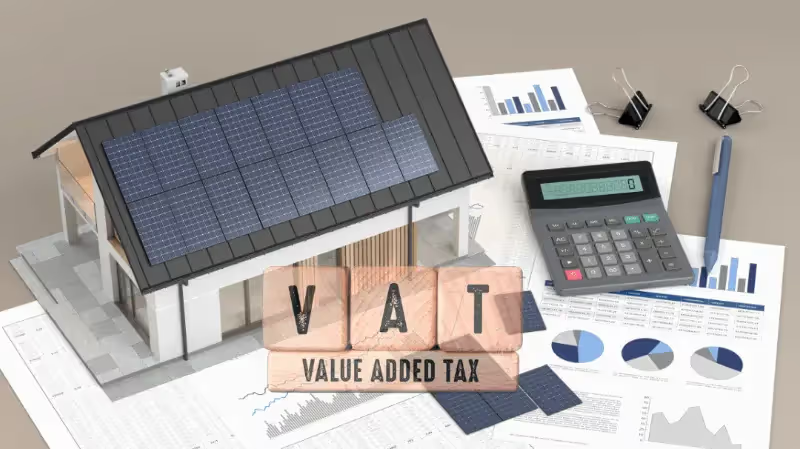
Our guide to VAT on solar panels is a big read. If you’re stuck for time, add this page to your bookmarks, and read this short overview instead…
The UK VAT rate is 20%. However, the UK government is offering a 0% VAT on various energy saving products until 2027; the list of products includes PV panels and solar batteries!
The savings are big. Expect to save £2,400 on a £12,000 system, with the discount being automatically applied by your installer.
To be eligible, you’ll need to ensure:

Unfortunately what this does mean, is that DIY installations aren’t eligible for the 0% VAT rate (unless you’re MCS registered).
Ready to get your fixed price on-screen for your solar panel system?
Use our clickable tool here, which automatically applies the 0% VAT rate discount.
The Value Added Tax (VAT) rate in the UK is currently 20%. The majority of retailers offer a VAT inclusive price, but you’ll still be paying it.
As an example, a £10,000 purchase will be inclusive of a £1,666.67 VAT charge. For retailers that offer prices excluding VAT, a £10,000 purchase would be £12,000 total (£2,000 VAT).
That’s the bad news covered, now for the good news…

The UK government is pushing towards their net-zero target by 2050. And that means that energy saving materials are consistently eligible for grants and tax breaks.
The current VAT rate on solar panels is 0%. The 0% VAT scheme is due to last until 31 March 2027 at which point it will refer to a new (but still lower) rate of 5%.
However, we’d expect that the 0% VAT scheme is extended beyond 2027. Pushing solar and green energy installations is one of the best ways for the UK to reach its net-zero target!
You can read more about the 0% VAT rate scheme on the government’s website here.
The eligibility criteria for the 0% VAT scheme is fairly simple.
Here are the most important things you need to know…

You’ll need to use an installer that is certified by the Microgeneration Certification Scheme (MCS).
This scheme is recognised by the UK government and is essentially, a governing body for green energy installations. It sets out guidelines to ensure that installations are completed to minimum quality standards.
MCS offers guidelines for installations for the likes of:
Our installers are registered with MCS, so your installation will qualify for 0% VAT. You can get prices on your setup by using our clickable solar panel tool here.
Found a good deal on used solar panels, solar batteries or other green energy materials on websites like eBay or similar?
These won’t be eligible for the 0% VAT scheme, as only brand new materials will qualify for tax relief.
And as a side note, if you do plan on buying used, remember that it’s unlikely you’ll be benefiting from a long warranty. Typically, we’d always advise you to buy materials for your solar panel system brand new.
The eligibility criteria isn't the same for commercial as it is for residential.
Sticking with residential, you simply need to ensure that what you're installing (if it's a green product) falls under the government's list of Energy Saving Materials (ESMs).
This includes, but isn't limited to:
In summary, materials for your solar panel system will be eligible for 0% VAT.
For anything that isn’t part of a solar panel system installation (such as boilers etc):
The VAT you’ll save will depend on the overall cost of your solar panel installation.
If you jump over to our guide covering solar panel costs here, you’ll see costs for a small system start at around £7,000, or, £12,000 with a suitable solar storage battery.
Taking the example of the full system:
In the example above, the total saving thanks to the 0% VAT scheme would be a massive £2,400!
Get your solar panel system installed and utilise the 0% VAT rate by using our clickable tool here.

If you’re planning a DIY solar panel installation, you won’t be eligible for the 0% VAT rate.
Only new materials supplied and fitted by a MCS registered installer are eligible for this scheme, so you’ll pay 20% VAT on all materials you purchase.
This is an important consideration, given that a DIY solar panel installation big enough to power the average property isn’t exactly a small project.
Using the above example, you’d actually save £2,400 by purchasing directly via an MCS registered installer. This saving pays for the majority of labour.
So, by using a professional installer rather than completing a DIY install you:
Feel free to read our guide covering DIY solar panel installation here. Typically, we’d only suggest a DIY installation if it’s going to be used to power low output outdoor appliances; a couple of lights and small power tools in an outdoor workshop for instance.
You can get a fixed price on-screen for your solar panel installation using our tool here. This is going to recommend the most suitable system for your property, and all prices will have the 0% VAT rate automatically applied.
Try our free quote tool. You'll have your personalised quote in under a minute.